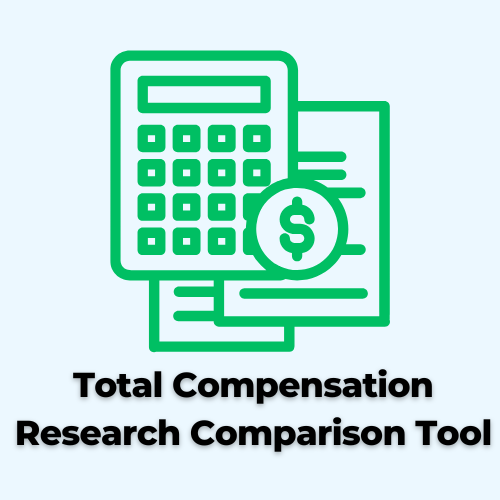Why You Should Focus on Your Total Compensation, Not Just Your Salary
Most individuals focus only on the base salary when evaluating how much a job pays. But doing so can limit your chances of receiving a fair offer, because the base salary is only one part of your total compensation.
Through our experience helping hundreds of clients negotiate offers from companies like Amazon, Google, Apple, Microsoft, and Meta (formerly Facebook), we have a deep understanding of how total compensation is defined, how that translates to yearly income, and how candidates can compare their projected earnings against other offers.
In this blog, we break down what total compensation is, why it’s important, and how calculating it correctly can help you achieve a better compensation package.
Want to Negotiate Your Offer? Get offer-specific guidance from a Salary Negotiation Coach. We help career professionals negotiate competitive job offers.
Or leverage our Salary Negotiation Courses and Templates.
 Job Offer Negotiation Course
Job Offer Negotiation Course
- Get our job offer negotiation strategies, templates, scripts, and guidance.
- Access our step-by-step lessons, compensation research guides, and tools.
- Access Now
 Raise Negotiation Course
Raise Negotiation Course
- Get our raise negotiation strategies, templates, scripts, and guidance.
- Access our step-by-step lessons, compensation research guides, and tools.
- Access Now
What is Total Compensation?
Total Compensation is the sum of all your monetary take-home earnings, including base salary, performance bonuses, equity, and sign-on incentives. An easy way to think about what’s included in your total compensation is anything that you’ll need to pay taxes on.
Why is Total Compensation important?
Understanding total compensation is important because it allows you to calculate your true annual income, compare compensation across companies, and complete your compensation research. Having this information in your back pocket increases your chances of negotiating a fair offer that gives you what you want and deserve.
What are the components of Total Compensation?
The components and structures of total compensation are different at every company, but we’ve listed the most common ones below.
Base Salary
Your base salary is the fixed guaranteed pay you receive in exchange for the work you do. It’s typically paid out in biweekly or monthly paychecks by your employer, and it does not include any other benefits, bonuses, or incentives, nor is it tied to performance.
Performance Bonus
This type of compensation is tied to your performance, but it’s not always guaranteed. If you do receive a performance bonus, it’s typically paid out at the end of a period (i.e., end of the year, quarter, etc.) as a fixed amount or a percentage of your base salary. Bonuses are typically tied to specific individual and company performance metrics, and the amount can fluctuate depending on personal and/or company performance.
Sales Commission
This performance-based compensation is usually found in sales-based roles, and it’s typically tied to the achievement of certain sales goals or metrics. Understanding your success rate upfront is key to determining the scope of this benefit.
Equity
Equity is quickly becoming one of the most sought-after financial perks at a company because it allows employees to share in the company’s success. Equity usually comes in the form of an equity grant and can be offered either as restricted stock (restricted stock units or restricted stock awards) or stock options. This grant will include a bundle of shares or options that vest over a defined schedule.
Restricted stock represents actual ownership of stock (i.e., you will receive shares of Apple stock) that will be transferred to employees when they meet certain conditions. Employees do not purchase these shares; they are provided by the company. Restricted stock is most common in offers from public companies (i.e., Google, Apple, Amazon, Meta, etc.).
Stock options represent the right to buy a defined number of shares at a defined price in the future. Stock options must be purchased (exercised) by the employee to convert into a share of stock. The value of a stock option depends on the difference between the purchase (exercise or strike) price and the current market value of the company’s stock (fair market value). Stock options are most common in startups or non-public companies.
Equity grants typically have a vesting schedule where employees only receive the equity if they work with the company for the duration of that schedule (i.e., three of four years). Most vesting schedules include an initial “Cliff” before you get the first payout (i.e., one year) with the remaining equity vested in increments defined by the company (i.e., monthly, quarterly, etc.) for the remainder of the vesting period.
Equity can be an extremely valuable form of compensation, but they will fluctuate based on the market value of the company. If the share value goes up, employees share in that increase, but if they go down, employees also share in that loss. The greatest consequence is that employees will forgo the equity if they leave the company before it vests. This is where the term “Golden Handcuffs” comes from: employees are tied to increasing equity and cannot walk away from the company until it vests to reap the reward.
Sign-on Bonus
These are one-time bonuses that new employees may receive when they join a company. They are often provided by companies as an incentive to work there or to cover any lost bonuses or unvested equity that employees may give up at their current company. These bonuses are usually paid out in the first year and can be in the form of one lump sum or paid out evenly in every paycheck that year. There are usually payback conditions tied to these bonuses where an employee may need to pay the bonus back if they depart the company within a certain period (i.e., leaving in your first year).
How do you calculate Total Compensation?
To calculate your total compensation, you will need to take the components above and outline each item in a table to view your estimated compensation. This provides a visual that allows you to look at your total compensation over multiple years if you have an equity component. For example, here is what the total compensation of a Software Engineer (E4) at Meta (formerly Facebook) may look like:
Meta Software Engineer Salary
You can utilize our total compensation calculator to input all of your compensation components. Our salary calculator is specifically designed to help you organize your compensation in a clear and user-friendly manner.

- Understand Total Compensation – Use our tool to break down and calculate the compensation in your job offer.
- Research & Compare Offers – Organize your compensation research and determine the right counter amount.
- Get Here
Why do you not include perks and benefits in Total Compensation?
You may have noticed that our list of total compensation components does not include certain perks and benefits such as relocation packages, health insurance, vacation/sick days, retirement benefits (401K, etc.), tuition reimbursement, phone stipends, commuter benefits, car allowance, and free food.
We’ve purposely omitted these items because we’re specifically focused on your take-home income. Why? Because focusing on your take-home pay gives you the best baseline to use when comparing total compensation across offers and negotiating the monetary portion of your compensation. But aren’t those benefits of value? Of course! You may have certain non-monetary benefits that fit your needs and are more valuable to you than pay.
The bottom line
Understanding these components can be tricky but knowing your total compensation—and by proxy, knowing how much to negotiate—will help ensure you get the job offer you deserve. Learn more about Why, When, and How You Should Negotiate Your Job Offer now that you know how to calculate your total compensation.
In Need of Salary Negotiation Support?
If you want to guarantee success in your salary negotiation, get Salary Negotiation Coaching from us. Our experience helping career professionals negotiate job offers will ensure you negotiate competitive compensation.
We also have our How to Negotiate a Job Offer and How to Negotiate a Raise courses, and Salary Negotiation Templates for those who want to learn at their own pace and gain the confidence and tools to negotiate their compensation. With downloadable email templates and job offer negotiation resources you will be prepared for all aspects of the salary negotiation.
 Job Offer Negotiation Course
Job Offer Negotiation Course
- Get our job offer negotiation strategies, templates, scripts, and guidance.
- Access our step-by-step lessons, compensation research guides, and tools.
- Access Now
 Raise Negotiation Course
Raise Negotiation Course
- Get our raise negotiation strategies, templates, scripts, and guidance.
- Access our step-by-step lessons, compensation research guides, and tools.
- Access Now



